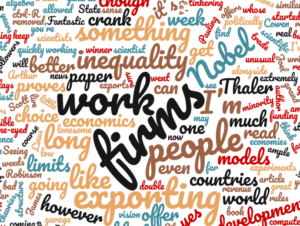So, week two, and it’s actually looking like I’ve started to work out how to negotiate the byzantine world of this university, though I imagine there have been more than a few explorers who thought “I’m on to something here” shortly before disappearing into a pit of quicksand. It’s been a fascinating week, though some moments – usually related to algebra that has been collecting dust on a shelf in my brain for 14 years – have reawakened long dormant demons.
- I’m sure all of you spent Monday morning glued to your computer screens, feverishly pressing ctrl-R, until the news emerged: Richard Thaler is this year’s Nobel laureate in economics (yes, yes, it’s not a real Nobel. Change the record). Thaler is a popular choice: Tim Harford describes his work admiringly, as does Tyler Cowen here; and this appreciation is written by one of his early co-authors. It is, however, driving some round the bend that people constantly say that his work ‘proves that people are irrational’. It does not. Rather, it proves that there are limits to the accuracy of rational choice models in some contexts, and these limits can be transcended by changing some assumptions about how people behave. To get a sense of this, no better place to start than Thaler’s ‘Anomalies’ column in the Journal of Economic Perspectives.
- A really good paper linking firm-level inequality to exporting, summarised on VoxDev. The paper builds Bloom’s Firming Up Inequality work, linking the dispersion of wages across firms to their exporting status (the intuition is that exporting firms see revenue growth and share this bonus with their workers – something that is predicted by behavioural models of firm-worker engagement rather than standard neo-classical economics), suggesting an inverted-U relationship between exporting and inequality. When no firms export, inequality is low, as all firms are similar; differentiation is introduced as some firms begin to export; and it is removed once all firms do. Of course, even in the most advanced economies a minority of workers work in exports.
- A super article about James Scott, author of Seeing Like a State, a book far more people in development should read (however much you may, like me, find it more than a little one-eyed).
- “Arthur B. Robinson is not some lonesome crank tinkering in his garage. He’s something much more unusual: an extremely well-connected crank, with ample funding…” Fantastic long read from FiveThirtyEight about a scientist who went from working alongside Linus Pauling (a double Nobel winner) to running experiments in his backyard, with the only scientists he trusts: his family. He is one of the founders of ‘alt-science’, winning followers among the politically important in the US at the moment. My take is that this isn’t all bad, so long as the rules of scientific inquiry still govern whose theories survive.
- I’m going to keep going on about this: the robots are (probably) not coming to destroy the pathways for economic development in poor countries.
- Ian Mitchell lays out CGD’s vision for how the UK can structure its trade offer to developing countries to be even better than what the EU offers. I like the general thrust of this, but I think we now need to get very quickly into the weeds: the details of exactly what is possible and how will determine the offer, more than the grand sentiments involved.
- This is Joel Embiid’s world – you’re just allowed to live in it.
Have a great weekend, everyone!
R

